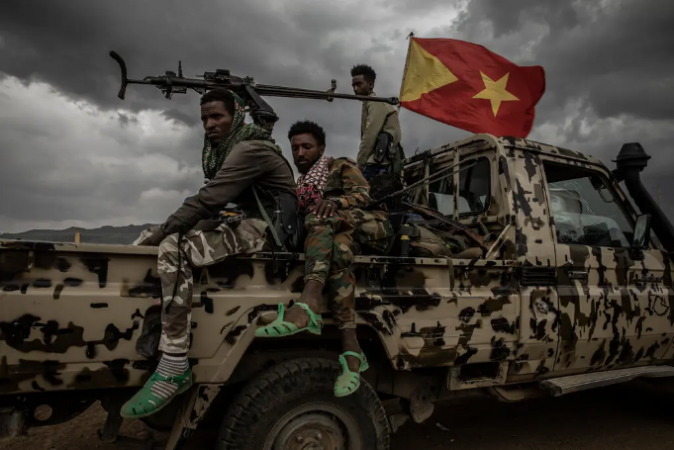
Ethiopia: Doctors at Tigray's biggest hospital say they only have a few days of insulin supplies left as fighting resumes between rebels and Ethiopian government troops, cutting off supplies in the region.
Medics at Ayder Specialist Referral Hospital have already run out of one type of life-saving drug and only a week's supply of another, which the head of the International Diabetes Federation (IDF) has called a "humanitarian crime".
The cessation of hostilities earlier this year in a bitter conflict between the Tigre People's Liberation Front (TPLF) and federal troops allowed the delivery of emergency supplies to the northern sector, previously described by the United Nations as D-. Actual blockade.
Now, with fighting resumed and both sides blaming each other for ceasefire violations, humanitarian officials say they have been unable to supply fresh supplies of food or medicine to Tigre for a month. The region is still largely isolated from the rest of Ethiopia, lacking basic services such as electricity, communications and banking.
Zimbabwe's lithium mine will provide in 2023 for China's major cobalt refiner
A senior doctor, who did not wish to be identified for security reasons, said, “We were distributing whatever was in the hospital to the patients, but especially this week, patients are coming in and we tell them that our I don't have insulin drugs." "He's come a long way." It's hard to get around... when they come over and we tell them there's no insulin, they're devastated. They sobb."
The doctor expressed concern that Ayder Hospital would suffer the same loss as last year, when supplies were cut for months in Tigre. "We will see patients die and fall on the road," he predicted.
Andrew Bolton, president of the IDF and professor of medicine at the University of Manchester, urged Abiy Ahmed's government to act quickly to ensure that insulin and other vital supplies reach Tigre.
"It really is a humanitarian crime," he said. "Even in times of war, there are agreements in place to ensure that essential medicines reach the population." And, based on the evidence I have, that doesn't seem to be happening right now."
According to a second doctor at Ayder Hospital, doctors in Tigre typically use two types of insulin: fast-acting, or regular, insulin and NPH, an intermediate-acting insulin.
BRICS FMs in favour of peaceful settlement of the Ukraine situation
"We have a very [small] amount on a regular basis; we reserve it for the management of acute diabetic complications," explained the doctor. "Otherwise, the patient's primary insulin preparation is intermediate-acting insulin, which mimics physiological insulin." We don't have any like that. It's been almost a month since we ran out of insulin."
Patients with type 1 diabetes require daily insulin injections to keep their blood sugar levels under control. Without it, their condition can quickly turn fatal.
Boulton has written a letter to Ethiopia's health minister, Lia Tadese Gebremedhin, urging them to remove "ongoing regulatory and safety barriers" that are "threatening the lives of many thousands of people living with chronic and non-communicable conditions, including diabetes." put in."
Before the war, more than 6,000 people were being treated for type 1 diabetes throughout the region, of whom about 2,500 were being treated in Ayder.
Bolton urged the government to "fully comply with international law and ensure necessary humanitarian access" to support vulnerable populations in the Tigre, in the letter, which was obtained by the Guardian.
He described the outlook in tigre for patients with type 1 diabetes as "terrible, as we saw in the nineteenth century [before the discovery of insulin]."
"I am not politically involved in either side of the conflict," he told the Guardian. “But, as IDF president, especially at this time – it has been 100 years since the first successful insulin injections were given in Toronto – our goal is that no one anywhere in the world should die because they can’t get treatment. Might be needed."
The government refuses to impose a blockade on Tigre, accusing the TPLF of making aid delivery too dangerous. The United Nations World Food Program (WFP), which has distributed all humanitarian cargo to the region on behalf of the World Health Organisation, Médecins Sans Frontires and others, has previously blamed the rebels for confiscating its fuel and refusing to return its aid trucks. accused of doing. an extended period of time.
How much debt will China write off through its interest-free loan programme to Africa?
After the IDF and others raised concerns about pharmaceutical stocks, the International Committee of the Red Cross (ICRC) was able to begin airlifting some supplies of insulin and other drugs in January with the support of the health ministry.
According to an ICRC spokesperson, all flights and humanitarian convoys to Tigray have been halted "until further notice" since the resumption of hostilities. Since August 22, the World Food Programme has been unable to lead a convoy into Tigray.
In late August, fighting erupted between the TPLF and government forces. According to the TPLF, federal troops and their allies have launched a major offensive against southern Tigray. The government, on the other hand, accused the TPLF of going first.